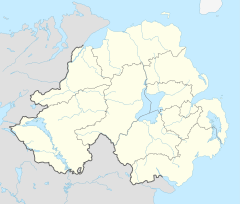
County Fermanagh is one of the thirty-two counties of Ireland, one of the nine counties of Ulster and one of six counties of Northern Ireland.

Earl Erne, of Crom Castle in the County of Fermanagh, is a title in the Peerage of Ireland. It was created in 1789 for John Creighton, 2nd Baron Erne, who had earlier represented Lifford in the Irish House of Commons. He had already been made Viscount Erne, of Crom Castle in the County of Fermanagh, in 1781, also in the Peerage of Ireland, and sat from 1800 to 1828 as an Irish representative peer in the British House of Lords. The title of Baron Erne, of Crom Castle in the County of Fermanagh, was created in the Peerage of Ireland in 1768 for his father Abraham Creighton. The Earl was succeeded by his eldest son, the second Earl. On his death the titles passed to his nephew, the third Earl. He was an Irish Representative Peer from 1845 to 1885 and also served as Lord Lieutenant of County Fermanagh during the same period. In 1876 he was created Baron Fermanagh, of Lisnaskea in the County of Fermanagh, in the Peerage of the United Kingdom. This was to allow the Earls to sit in the House of Lords by right, rather than having to stand for election as Representative Peers. An earlier title of Baroness Fermanagh in the Peerage of Ireland was created for Mary Verney on 13 June 1792, but became extinct on her death on 15 November 1810.
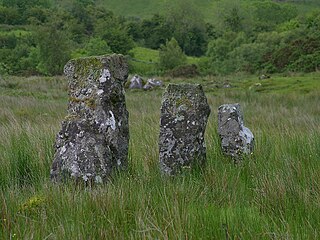
Drumskinny is the site of a stone circle in the townland of Drumskinny, County Fermanagh, Northern Ireland. With the inclusion of an adjacent cairn and alignment, the stone circle is a State Care Historic Monument in Fermanagh and Omagh district, at grid ref: H 2009 7072. The site was excavated in 1962 and is believed to have been built around 2000 BC.

Fermanagh and South Tyrone is a Northern Ireland parliamentary constituency in the British House of Commons. It is currently represented by Pat Cullen of Sinn Féin.

Belleek is a large village and civil parish in County Fermanagh, Northern Ireland. While the greater part of the village lies within County Fermanagh, part of it crosses the border and the River Erne into County Donegal. It lies in the historic barony of Lurg. It had a population of 904 people in the 2011 Census, and is situated within Fermanagh and Omagh district, around 7 kilometres (4 mi) east of Ballyshannon.
"Unity" was the political label for a series of electoral pacts by Irish nationalist, Irish Republican and socialist candidates in Northern Ireland elections in the late 1960s and early 1970s. It also contested elections as a party in its own right, electing six councillors in the 1973 local council elections in the Fermanagh and Dungannon areas, although this was reduced to two members of Fermanagh council in the next election in 1977.
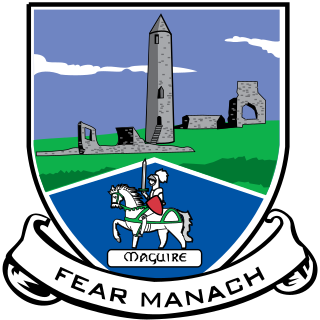
The Fermanagh County Board of the Gaelic Athletic Association (GAA) or Fermanagh GAA is one of the 32 county boards of the GAA in Ireland and is responsible for the administration of Gaelic games in County Fermanagh, Northern Ireland.
Brewster Park is a GAA stadium in Enniskillen, County Fermanagh, Northern Ireland. It is the home ground of the Enniskillen Gaels and the County ground of Fermanagh GAA. The ground was renovated in 2007 and now has a capacity of roughly 18,000. The ground was named for Mickey Brewster, a Fermanagh and Enniskillen Gaels player and father of Paul Brewster.
Owen Gerard Carron is an Irish republican activist who was Member of Parliament (MP) for Fermanagh and South Tyrone from 1981 to 1983.
Donagh is a small village and townland in County Fermanagh, Northern Ireland. It lies between Lisnaskea and Newtownbutler in the south-east of the county. In the 2001 Census it had a population of 255. It is situated within Fermanagh and Omagh district.
The 2004 All-Ireland Senior Football Championship, known for sponsorship reasons as the 2004 Bank of Ireland All-Ireland Senior Football Championship was the premier Gaelic football competition in 2005. It consisted of 33 teams and began on Sunday 2 May 2004. The championship concluded on Sunday 26 September 2004, when Mayo were defeated by Kerry by 1–20 to 2–9.
The Fermanagh Senior Football Championship is an annual Gaelic Athletic Association club competition between the top Gaelic football clubs in Fermanagh. The winners of the Fermanagh Championship qualify to represent their county in the Ulster Senior Club Football Championship, the winners of which go on to the All-Ireland Senior Club Football Championship.
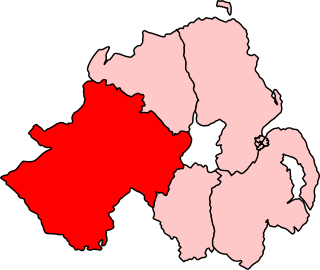
Fermanagh and Tyrone was a county constituency of the Parliament of Northern Ireland from 1921 to 1929. It returned eight MPs, using proportional representation by means of the single transferable vote.

South Fermanagh was a constituency of the Parliament of Northern Ireland.
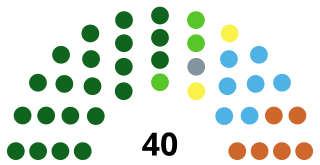
Fermanagh and Omagh District Council is a local authority in Northern Ireland and was established on 1 April 2015. It replaced Fermanagh District Council and Omagh District Council and covers most of the southwest of Northern Ireland. Its first election was on 22 May 2014, and it acted as a shadow authority prior to the creation of the Fermanagh and Omagh district in April 2015.

Historically, Fermanagh, as opposed to the modern County Fermanagh, was a kingdom of Gaelic Ireland, associated geographically with present-day County Fermanagh. Fir Manach originally referred to a distinct kin group of alleged Laigin origins. The kingdom of Fermanagh was formed in the 10th century, out of the larger kingdom of Uí Chremthainn, which was part of the overkingdom of Airgíalla. By the late 11th century it had grown to cover all of what is now County Fermanagh. The kingdom came to be ruled by the Mag Uidhir (Maguire) clan from the late 13th century onward. They were based at Lisnaskea, and their royal inauguration site was nearby Sgiath Gabhra (Skeagoura), now called Cornashee. Under Hugh Maguire, Fermanagh was involved in the Nine Years' War against English rule. His successor, Cú Chonnacht Óg Mag Uidhir, was one of the Gaelic Irish leaders who fled Ireland during the Flight of the Earls. Fermanagh was subsequently merged into the Kingdom of Ireland as County Fermanagh.

Seán Lynch MLA is an Irish republican Sinn Féin politician and a former MLA for the constituency of Fermanagh and South Tyrone. He was a former Provisional Irish Republican Army (IRA) leader in the Maze Prison.
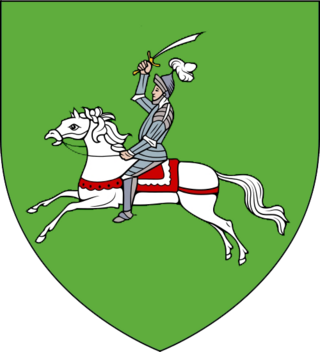
The Maguire family is an Irish clan based in County Fermanagh. The name derives from the Gaelic Mac Uidhir, which is "son of Odhar" meaning "dun", "dark one". According to legend, this relates to the eleventh descendant of Colla da Chrich, great-grandson of Cormac mac Airt, who was monarch of Ireland about the middle of the third century. From the 13th to the 17th centuries, the Maguire family were kings of Fermanagh.

The Fermanagh county football team represents Fermanagh GAA, the county board of the Gaelic Athletic Association, in the Gaelic sport of football. The team competes in the three major annual inter-county competitions; the All-Ireland Senior Football Championship, the Ulster Senior Football Championship and the National Football League.
